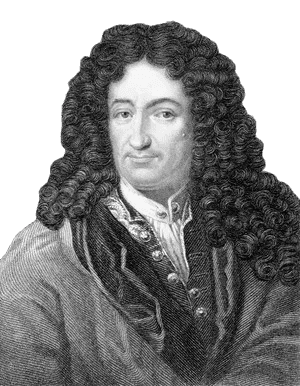Life and achievements
Early life
Gottfried Wilhelm Leibniz was born on 1st of July 1646 in Leipzig, Saxony to a learned family. His father, Friedrich Leibniz, was a professor of moral philosophy, and presumably, young Leibniz's interests were shaped by this environment. Leibniz received his first education at home, and at the age of 14, he lost his father in 1652, which left him a vast library, which was a perfect ground for his developing interest.
Leibniz was already reading Latin by age 12 and had already written Latin poetry, evidence of his early genius. He started his education at Leipzig University at the age of 14, and he studied philosophy, law, and mathematics.
Leibniz enrolled for a bachelor's degree in philosophy in 1661 and graduated in 1662 before proceeding to a master's degree, which he earned in 1664. His early philosophical work mainly focused on the principle of individuation, which formed the basis of his later metaphysical work.
Leibniz's education also included the field of law, and in 1666, he defended his thesis in legal philosophy. By this time, Leibniz had also gained diverse interests that would shape his career as a polymath, including theology and metaphysics, mathematics, and science.
Legacy
Leibniz's contribution is vast and multi-disciplinary: it touches the areas of philosophy, mathematics, and science. He independently invented calculus, and his notations are still in use. His most important contribution was in calculus, which he independently worked on with Isaac Newton. Though there is debate over who was the first to discover calculus, Leibniz's work is fundamental to mathematics. He also greatly impacted computer science since his binary number system has formed the basis of today's computers.
Leibniz's philosophical work, especially on monads and pre-established harmony, forms part and parcel of current debates in metaphysics. Leibniz's opinion that it is the best of all possible worlds was adopted as the foundation of philosophical optimism by such philosophers as Immanuel Kant. Even though Voltaire ridicules this view in his Candide, it constitutes an essential part of Leibniz's philosophy.
His work in logic also showed the way for the modern developments in symbolic logic and set theory, which are significant branches of philosophy with an excellent mathematical base that has implications even today. Today, Leibniz is known for his inventions and innovations and his attempt to harmonize knowledge and become a synthesizer, which put him at the center of Western philosophical tradition.
Milestone moments
Jul 1, 1646
The birth of Gottfried Wilhelm Leibniz
Gottfried Wilhelm Leibniz was born in Leipzig, Germany to father Friedrich Leibniz who was a professor of moral philosophy.
His father had a significant impact on the formation of his academic choice.
Leibniz was allowed to read his father's library from childhood, which is why he was interested in philosophy, theology, and languages from early childhood.
By the age of 14, he joined Leipzig University, where his academic journey began, making him one of his generation's most prominent thinkers.
This would shape his polymathic career since he was exposed to several subjects at a tender age.
Apr 10, 1666
Early Works in Law and Graduation
After the dissertation on the legal cases that were hard to solve, Leibniz obtained his doctorate in law from the University of Altdorf in 1666.
His early works, which include the principles of arithmetic, the principles of algebra, and the principles of logic, established the basis for his subsequent advancements in combinatorial logic and legal system.
He rejected an opportunity to take up an academic chair position at Altdorf and engaged himself in other activities within the political and intellectual society.
This period also began Leibniz's philosophical endeavors, especially in metaphysics and logic.
His De Arte Combinatoria, published in the same year, contains ideas that formed his system of monads and his theory of pre-established harmony.
Nov 20, 1676
The Paris Years: The History of Calculus
Leibniz relocated to Paris in 1672, where he encountered other scholars, such as Christiaan Huygens, who tutored him in mathematics.
In this period, Leibniz was to make his most significant contribution to mathematics in the form of calculus.
It is interesting that Isaac Newton also developed calculus around the same time. Still, Leibniz's notation for integrals and derivatives has stood the test of time.
During this period, Leibniz also broadened his knowledge, reading physics, philosophy, and theology and exchanging letters with other European scholars.
Staying in Paris meant that he became one of Europe's most influential intellectuals.
Oct 18, 1695
The Publication of the Theory of Monads
The original philosophical idea was the theory of monads Leibniz formulated in his significant works and fully formed by 1695.
He said that the universe is composed of primary, uncomposite beings known as monads, and each has the image of the universe within them.
This idea was not traditional atomistic views but a new approach to metaphysics.
Conversely, Leibniz holds that monads do not influence each other but are in harmony, and God created this.
Later philosophers adopted this idea, which is still one of the significant ideas associated with Leibniz and his philosophical ideas in metaphysics.
